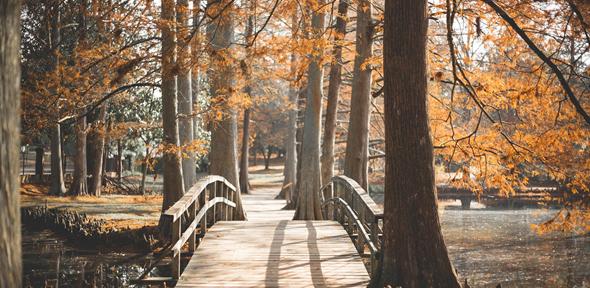
|
iRecord: Share Your Wildlife Sightings to Support Local Biodiversity In 2020, the University published its first Biodiversity Action Plan (BAP). One of its aspirations was to engage with the University community to understand which species are using the estate and how this changes over time. ` We would like to invite staff and students to get involved in our biological recording project, using iRecord. This simply involves providing information on when and where a particular species was found. Biological records can be added to national and international datasets, used for research or conservation and help inform planning and development, as well as wildlife legislation. To find our more and to get up and running on the iRecord app, visit the Sustainability webpages You can join the Biodiversity Yammer Group too! |
|
Eco-Anxiety & Eco Resilience The current pressures on global mental health seem heavier than ever as 2022 has brought with it concerns about climate change, wars and the continuation of the pandemic. This makes this year’s University Mental Health Week even more important to help staff and students develop the tools to help us look after our mental wellbeing. For us in the Sustainability Team, eco-anxiety, or climate anxiety, is a constant in our professional roles. Eco-anxiety is not a clinical condition, as noted by the Climate Psychology Alliance, because it is ‘an adaptive emotional reaction to real threats.’ Nevertheless, the feelings associated with it (fear, frustration, sadness) can have a real impact on how well feel at work and at home. Every one of us joined the team because we were worried about climate change and wanted to play some part in global solutions to its impact. As a result, we all sometimes feel overwhelmed and powerless about the current state of progress towards climate adaptation and mitigation. However, all is not lost, and there are a number of things you can do to lighten your mental load if you sometimes feel the same way as us. |
|
Talk it out Speaking about how you feel and what your concerns are in a safe space is a great way to lighten your emotional load and connect with others. Climate Cafes are one example of how you could structure this in the workplace or in College. The Climate Psychology Alliance defines a climate café as ‘a simple, hospitable, empathetic space where fears & uncertainties about our climate & ecological crisis can be safely expressed’. Cambridge University Press and Assessment recently wrote a great article for our newsletter, Greenlines, about their experience of setting one up and how the collective feeling inspired staff to make green changes in their personal lives and at work. Contact Amy Budd at info@cambridgeinternational.org with the subject ‘Climate café if you want to hear more about their experience. |
|
Empower yourself through education We in the Sustainability Team firmly believe that knowledge is power, and so educating yourself about climate change can be a great first step towards building a more resilient mindset. There are many ways to learn, from formalised courses like Eco Resilience from the World Forest Organisation, to making use of some of the many resources on the Sustainability Team’s or Cambridge Zero’s websites. You could also take, our Environmental Sustainability induction Module to refresh your memories on what we get up to across the University. If reading isn’t your thing, why not try an episode of Cambridge Zero’s Climate Talks or watch some of the University’s Youtube videos about many different climate topics. |
|
Take action The best way to stop feeling powerless is to take some action whether this be in a personal or a professional capacity. You could join a Green Impact Team, become a departmental Environment and Energy Coordinator, or write a contribution to Greenlines. If you are a student, you could become a Green Officer for your MCR or JCR and join the many different environmental societies and organisations that exist across the University. For more information about how to get involved for students click here, and for how to get involved for staff, click here. |
Follow our 10 things to help and enjoy the environment
Engaging with nature and the natural environment is a fantastic way to destress and improve your mental wellbeing. Why not follow our 10 recommendations on how you can feel better and enjoy the outdoors a bit more.
|
1 – Leave a Mess! Resist the urge to keep all parts of your outside space tidy. Leave fallen leaves, broken ceramic plant pots, plant stalks and general organic debris as micro habitats. |
 |
2 –See what you can see Use a platform like iRecord the iNaturalist ‘Seek’ app to identify and catalogue the nature you have seen while spending more time outside. |
|
|
3 – Mow less Cut that grass less often or better still leave patches (or a whole lawn) uncut, don't worry about bald spots for they are great from solitary insects. |
 |
4 – Eat your garden If you are lucky enough to have a garden, why not try planting some herbs or easy vegetables like tomatoes. If space is more limited, you could grow some cress or replant the ends of garlic or spring onions. |
|
|
5 – Boost Biodiversity Hang a nest box, create a feeder station or cut a hole in your fence as a wildlife corridor. |
6 – Make a splash! Create a small pond or water source, ensuring a ramp as an escape route for any creatures that fall in or add a few large pebbles as perches for drinking or bathing from. |
||
|
|
7 – Stimulate your senses Meditate and just breathe outside, go barefoot on the grass or earth, hug a tree, or listen to bird song. |
8 – Eat al fresco As the first day of their 30 days wild, The Wildlife Trusts recommends a Big Wild Breakfast. While you eat breakfast outside, see how much wildlife you can see in 30 minutes. Alternatively, why not enjoy lunch or dinner in your garden or at the local park? |
|
 |
9 – Indulge your inner artist Make a photocollage or do a sketch of something interesting or especially beautiful you have found in nature.
|
10 – Take it outside Try that catch up meeting as a phone call or a walk in--person with your colleagues. You could also go for a stroll on your lunch break. |
